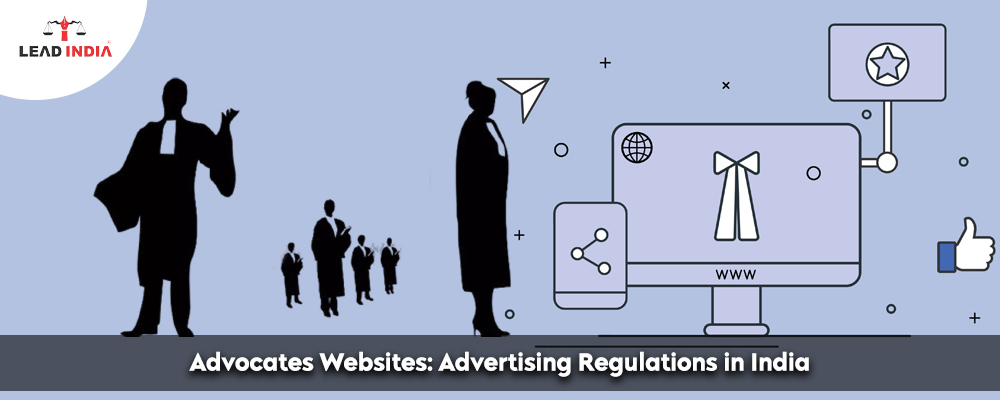The importance of having a website in the modern digital age cannot be emphasized. Websites are virtual addresses that provide people and businesses with extensive platforms to display content, keep track of events, and interact with consumers or clients. But when it comes to the legal industry, the regulations governing marketing are frequently strict and vary greatly between nations.
Law Related to Advocates Websites Advertising
- According to Section 49(1) of the Advocates Act, 1961, the Bar Council of India is able to create rules and regulations in order to carry out its duties under the Act.
- The Bar Council Rules, established by the Indian Bar Council, address a number of topics, including the process for choosing new members, the professional ethics of advocates, the obligations of advocates, and the eligibility requirements for advocates.
- The UK, where commercializing the legal profession through promotions is seen as dishonorable and may lead to unfair practices, is where the idea that prohibits legal practitioners in India from promoting their services is derived.
- The Bar Council Rules in India, particularly Rule 36, which prohibits advocates from selling their services, underline this prohibition on advertising legal services.
Need A Legal Advice
The internet is not a lawyer and neither are you. Talk to a real lawyer about your legal issue

Rationale Behind the Restrictions: Advocate Websites
Judicial Precedents
- Judicial precedents are court rulings, particularly those from higher courts, that establish a norm or guideline for related cases in the future. Policies and procedures can be greatly impacted by these choices.
- The landmark case, Bar Council of Maharashtra v. MV Dabholkar (1975), is a prime illustration of how the prohibition on lawyer advertising in India was strengthened.
- Justice Iyer’s remarks in the case served as a reminder that advertising by attorneys is prohibited in India because it would diminish the dignity of the legal profession.
Respect and Honesty in the Legal Field
- The legal profession is dedicated to maintaining justice, rights, and the integrity of the law; it is more than just a job. Lawyers are not allowed to advertise in India because upholding a particular standard of decency and purity is necessary to ensure this.
- The highest court in the land has continuously affirmed that the Bar Council of India is crucial to preserving the honor and integrity of the legal profession.
How Can Lawyers Make Themselves Known?
The Bar Council of India (BCI) Rules prohibit lawyers in India from directly and explicitly marketing their services. They are still able to advertise their services and display their presence, though, as long as they follow the BCI Rules.
- One approach is to keep up a formal website with broad facts about their areas of expertise, credentials, and phone numbers. Nothing on the website, not even client testimonials, success rates, or fees, should be interpreted as soliciting or advertising legal services.
- Attending legal conferences, seminars, and other events can also help them build their reputation and connect with colleagues and prospective clients. They can also publish essays or legal views in respectable journals or online discussion boards, provided that this is done without trying to attract new clients.
Prohibition of Advocate Advertisement: Reasons
- To stop unethical behavior: Since advertising can boost competitiveness, lawyers may turn to unscrupulous tactics to draw in business. Additionally, the cost of advertising may increase the prices that attorneys charge, which would lower the standard of legal services.
- To avoid a difference in the quality of legal representation:Large firms may dominate the legal market if small or mid-sized law firms lack the resources to market their services. Those who cannot afford the services of larger businesses may not be represented as a result of this.
- To stop false information from being spread: Hyperbole in advertisements has the potential to hurt the public. Legal aid seekers’ interests may be harmed, and ethical norms may be broken by advertising legal services.
Other countries have entirely different regulations pertaining to advertising. In the USA, there is a thriving legal advertising market wherein attorneys are free to promote their areas of expertise and the cases they handle.
In order to provide litigator options, a number of legal-tech platforms are currently emerging in the legal field that enable advocates to display their credentials, experience, expertise, etc. The time has come for the Indian legal sector to welcome change and engage in beneficial brand promotion. However, in order to prevent malpractice, the legislature must create certain rules for promoting the legal profession.
One can talk to a lawyer from Lead India for any kind of legal support. In India, free legal advice online can be obtained at Lead India. Along with receiving free legal advice online, one can also ask questions to the experts online free through Lead India.





 Talk to a Lawyer
Talk to a Lawyer